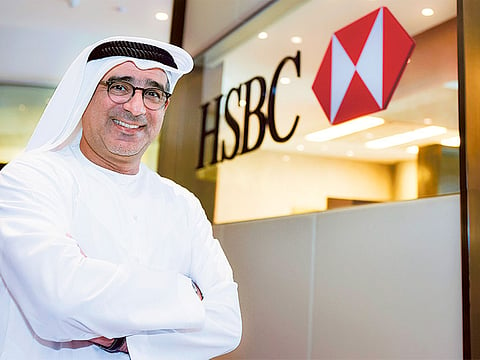At 70, HSBC looks forward to a lasting partnership in the UAE
The bank is closely linked to the history of UAE’s economic progress

Dubai: HSBC, the first bank to be established in the UAE, seven decades ago has partnered the UAE’s spectacular transformation into a modern economy and the bank is fully committed to country’s future endeavours, Abdul Fattah Sharaf, UAE CEO of HSBC told Gulf News in an interview.
In 1946, His Highness Shaikh Rashid bin Saeed Al Maktoum, Ruler of Dubai, viewed the arrival of a modern bank as key to his desire to build a modern economy. Since then, HSBC’s association with the UAE has been a story of partnership and progress.
In the 1950s the bank helped raise the funds to dredge Dubai Creek, where silting sands threatened the tiny seaport’s future. The Creek’s opening was the beginning of Dubai’s transformation into global entrepot.
“Our story of partnership with the UAE continues today and tomorrow. HSBC was the bank that helped our merchant forefathers grow their businesses. Today, the bank is helping the Dubai government raise $3 billion (Dh11 billion) to build Al Maktoum International Airport, the world’s largest global gateway and future home of Emirates airline,” said Sharaf.
As an Emirati, Sharaf said it’s a matter of great honour to lead this bank in its eighth decade in the UAE.
As the first bank to set up shop in the country HSBC has witnessed the transformation the concept of banking in the country reflecting the UAE’s changing ambitions.
Benefits
In 1946, Frank Johnson (one of the first HSBC bankers who came to the region) met a cash-based pearl-harvesting economy in terminal decline and an import-export business ravaged by the Second World War. The merchants, many who traded gold, were used to doing without a bank, but quickly they realised the benefits. By March 1947, the bank had 42 active accounts. By the 1960s oil had been found and the pace of progress accelerated. International oil and gas clients needed an international bank that could finance exploration and pay their staff.
“As the oil revenues flowed, the UAE began to create sovereign wealth. Suddenly anything felt possible. In 40 years we went from dhows to DP World, which runs the world’s ninth busiest container port and has operations in 40 countries. In aviation, Dubai International became the world’s busiest airport in just 50 years,” said Sharaf.
Today, modernisation is visible every aspect of the UAE economy. Retailing is big business. More than 320,000 people visit Dubai’s two largest shopping malls each day — that’s an annual footfall equivalent to France and Spain’s population combined.
Stated ambition
Health care is another area where a post-oil economic future is being created through significant investment. Culture, design, fashion, art and lifestyle are also cornerstones on which the UAE’s future is being built.
“Throughout the last 70 years, HSBC has witnessed the UAE’s spectacular transformation from seaport to entrepot. But more than that, we’ve had the privilege of supporting its vision and ambition. With the UAE’s stated ambition of becoming number one globally for ease of doing business by 2021, many new opportunities lie ahead,” said Sharaf.
Sign up for the Daily Briefing
Get the latest news and updates straight to your inbox



